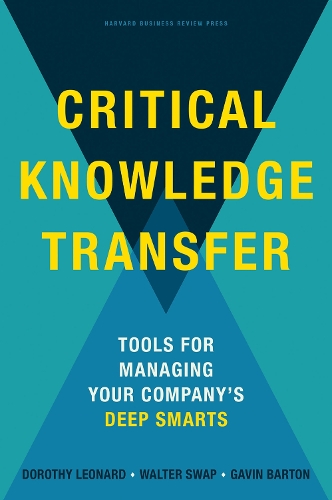
Critical Knowledge Transfer: Tools for Managing Your Company's Deep Smarts
(Hardback)
Publishing Details
Critical Knowledge Transfer: Tools for Managing Your Company's Deep Smarts
By (Author) Dorothy Leonard-Barton
By (author) Walter C. Swap
By (author) Gavin Barton
Harvard Business Review Press
Harvard Business Review Press
2nd February 2015
United States
Classifications
General
Non Fiction
658.4038
Physical Properties
Hardback
240
Width 155mm, Height 234mm
453g
Description
Addressing the critical issue of knowledge transfer within an organization, this book offers practical advice onhow to structure the transition of documented information and the even more valuable nondocumentedknowledge that outgoing staffers havebefore it leaves with them.Whether a result of a retirement, an acquisition, promotions, transfers, or layoffsall organizations have lostwhat these authors call "deep smarts" when workers leave. Now, Dorothy Leonard and Walter Swap, coauthorsof the popular Deep Smarts, and their coauthor Gavin Barton offer a solution.Based on theory and research, this book offers a variety of examples, tools, and templates to take action before essential knowledge disappears.
Reviews
"In today's workplace, knowledge is power--but only if you can capture, preserve, share, and use it. That's where Critical Knowledge Transfer: Tools for Managing Your Company's Deep Smarts comes in. This book is highly useful for anyone concerned with the loss of organizational knowledge and the costs associated with it." -- TD magazine (Association for Talent Development) ADVANCE PRAISE for Critical Knowledge Transfer: Teresa Roche, Vice President and Chief Learning Officer, Agilent Technologies-- "An outstanding and comprehensive field guide for anyone who really cares about talent in his or her organization. Leonard, Swap, and Barton outline the foundations of knowledge transfer and provide practical applications to help you reflect thoughtfully and act effectively on critical knowledge transfer issues. A pragmatic and compelling book." T.J. Elliott, Vice President and Chief Learning Officer, ETS-- "When those in our organizations with 'deep smarts' leave, taking their knowledge with them, what do we do The techniques in this book, with their insightful specificity and proven practicality, will benefit the leader who wishes to solve this critical dilemma." Richard Gross, Vice President, Learning and Development, Cargill, Inc.-- "Critical Knowledge Transfer provides a thought-provoking, comprehensive, and practical guide for transferring critical, experience-based knowledge. I highly recommend it for business and HR leaders alike." Steve Phillips, Chief Information Officer, Avnet, Inc.-- "With the speed of business today, companies can't afford to lose the deep, experience-based knowledge of departing employees and leaders. Critical Knowledge Transfer provides profound insight into this challenge, along with concrete tools, techniques, and examples that businesses can apply immediately to prevent this hard-won knowledge from walking out the door forever."
Author Bio
Dorothy Leonard is the William J. Abernathy Professor of Business Administration Emerita at Harvard Business School and chief adviser of the consulting firm Leonard-Barton Group. She is the author or coauthor of three Harvard Business Review Press books: Deep Smarts, When Sparks Fly, and Wellsprings of Knowledge. Walter Swap is Professor of Psychology Emeritus, former Chairman of the Psychology Department, and former Dean of Colleges at Tufts University. He is the coauthor of Deep Smarts and When Sparks Fly. Gavin Barton is managing director of the Leonard-Barton Group and a principal of GB Performance Consulting. He holds a doctorate from Boston University.
